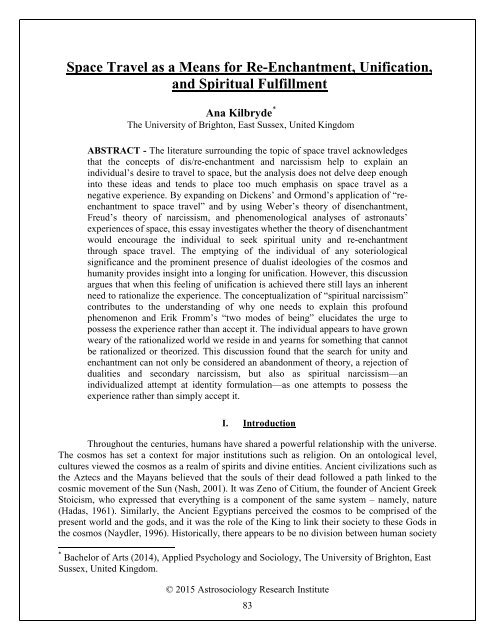THE JOURNAL OF ASTROSOCIOLOGY VOLUME 1
qd9nb3s
qd9nb3s
- No tags were found...
You also want an ePaper? Increase the reach of your titles
YUMPU automatically turns print PDFs into web optimized ePapers that Google loves.
Space Travel as a Means for Re-Enchantment, Unification,and Spiritual FulfillmentAna Kilbryde *The University of Brighton, East Sussex, United KingdomABSTRACT - The literature surrounding the topic of space travel acknowledgesthat the concepts of dis/re-enchantment and narcissism help to explain anindividual’s desire to travel to space, but the analysis does not delve deep enoughinto these ideas and tends to place too much emphasis on space travel as anegative experience. By expanding on Dickens’ and Ormond’s application of “reenchantmentto space travel” and by using Weber’s theory of disenchantment,Freud’s theory of narcissism, and phenomenological analyses of astronauts’experiences of space, this essay investigates whether the theory of disenchantmentwould encourage the individual to seek spiritual unity and re-enchantmentthrough space travel. The emptying of the individual of any soteriologicalsignificance and the prominent presence of dualist ideologies of the cosmos andhumanity provides insight into a longing for unification. However, this discussionargues that when this feeling of unification is achieved there still lays an inherentneed to rationalize the experience. The conceptualization of “spiritual narcissism”contributes to the understanding of why one needs to explain this profoundphenomenon and Erik Fromm’s “two modes of being” elucidates the urge topossess the experience rather than accept it. The individual appears to have grownweary of the rationalized world we reside in and yearns for something that cannotbe rationalized or theorized. This discussion found that the search for unity andenchantment can not only be considered an abandonment of theory, a rejection ofdualities and secondary narcissism, but also as spiritual narcissism—anindividualized attempt at identity formulation—as one attempts to possess theexperience rather than simply accept it.I. IntroductionThroughout the centuries, humans have shared a powerful relationship with the universe.The cosmos has set a context for major institutions such as religion. On an ontological level,cultures viewed the cosmos as a realm of spirits and divine entities. Ancient civilizations such asthe Aztecs and the Mayans believed that the souls of their dead followed a path linked to thecosmic movement of the Sun (Nash, 2001). It was Zeno of Citium, the founder of Ancient GreekStoicism, who expressed that everything is a component of the same system – namely, nature(Hadas, 1961). Similarly, the Ancient Egyptians perceived the cosmos to be comprised of thepresent world and the gods, and it was the role of the King to link their society to these Gods inthe cosmos (Naydler, 1996). Historically, there appears to be no division between human society* Bachelor of Arts (2014), Applied Psychology and Sociology, The University of Brighton, EastSussex, United Kingdom.© 2015 Astrosociology Research Institute83


